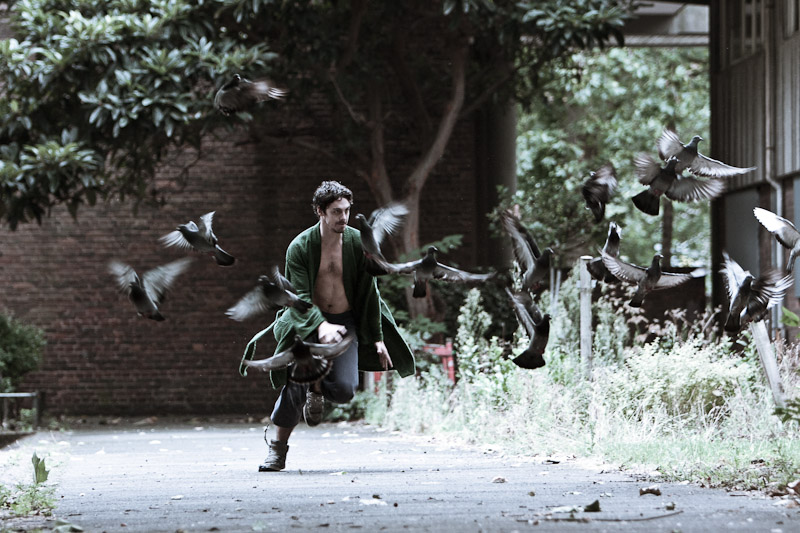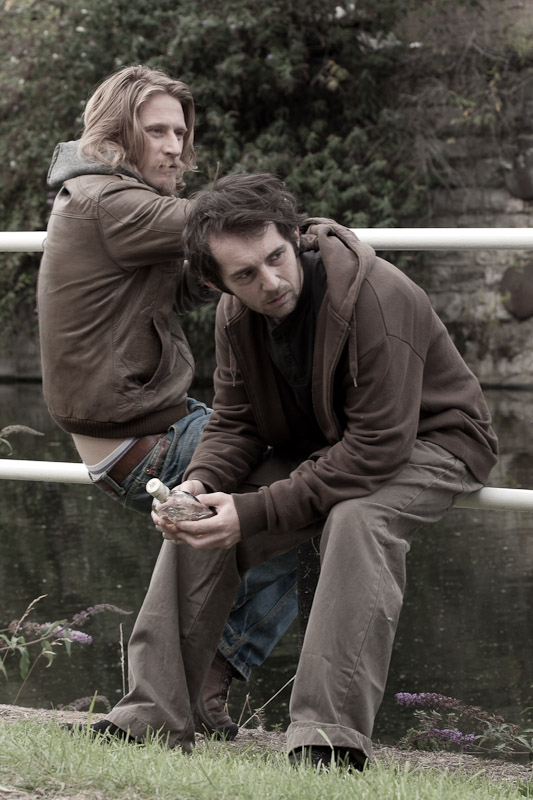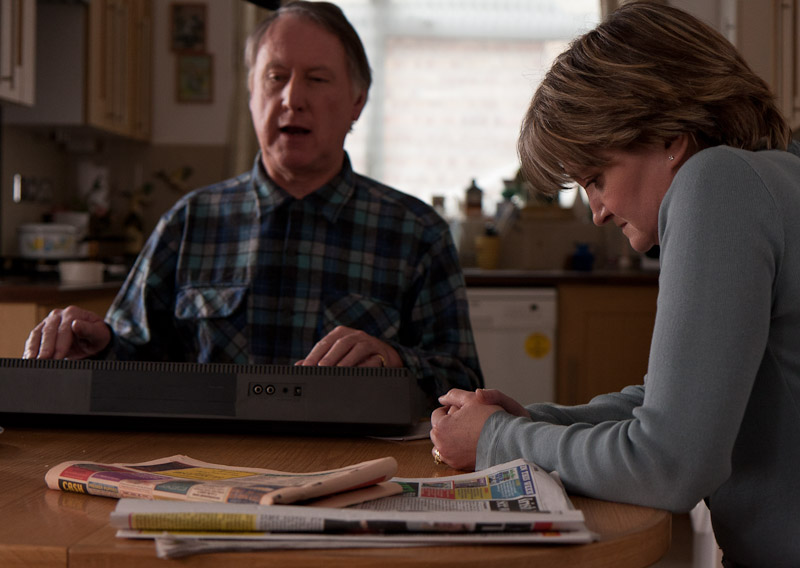
Is it the thrill of the chase? Andrew Hawley on Strays
The eternal question for any me and any other stills photographer is how do I get my next job? It’s hard work. Except for maybe those at the very top of the industry, we’re always continuously working on getting our next job and keeping ourselves in the minds of our potential employers.
“…it would be great if you could share any tips or insight for getting into this kind of work” – R.Taylor
“…despite having a few friends who work in film & television I’ve always found that area of photography completely impenetrable.” – Eleanor Jane eleanorjane.co.uk links 24.06.2011
“…I wonder if you have any information to share on the topic of actually getting the job”.” – AW Leonard
“A topic idea for you – Networking the Movies – How does a Unit Stills Photographer network?” – Mike O’Neill mikeoneillphotography.wordpress.com
Networking
It really isn’t so much about what you know, as who you know. The vast majority of the best jobs (as far as I’ve seen) in Film and TV, simply don’t get advertised. If anyone can show me an advertisement for a stills photographer for a Universal, Fox, Sony or even any serious independent films, I want to see it.

Even serial killers like to network - Making Ugly a Squarebox Yellow film
Your best start in production stills as with many other film making disciplines is to find the film makers in your area and network with them. I used www.mandy.com and www.filmcrewpro.com early on to establish links with people who are working on low budget and independent projects.
I should be clear and say that I have never seen or heard of paid work as a stills photographer on any of these sites. These are projects are often time consuming, and under-resourced but a great place to both cut your teeth shooting production stills and to meet the ambitious and talented freelancers who are also starting out. Be aware that these are not your only networking opportunities, so work how how to meet other film makers and get to it!
By working hard on low budget projects, you get to know who’s good, who’s going somewhere and who can be your advocate in getting onto jobs that are not advertised. Those jobs are going to trusted photographers who have proven their worth in the past – our job is to make that person us! This is point is reinforced by pro stills photographer Alex Bailey who also blogs prolifically on the topic of production stills over at buntyme.wordpress.com.
“Networking and contacts certainly also help… Keeping your ear to the ground and knowing what might be coming up and making sure that your name is in the frame.” Alex Bailey on The Key to success
My first paying gig came directly through networking (which got me onto the very promising pilot of I Rock by production company Mum’s Spaghetti). The work I did on the pilot was loved and appreciated by David and Rob from Mum’s Spaghetti who advocated strongly in my favour to hire me as the stills photographer when their series was commissioned by the ABC.
There’s a huge body of people in film and television and the more you know and the more you help out, the more comes back to you. If I were spiritual, I’d call it Karma, but really its just about reciprocity. Don’t just advocate yourself, but other professionals with talent who will do the same for you. Keep in contact with the people you’ve enjoyed working with and who you know do good work. The best bit about this piece of advice is that it really is quite easy – your professional peers often become your friends.
Marketing

A clever jingle isn't enough? Wavelengths - A Fee Fie Foe Film
I believe that marketing yourself is key to your success. Your core marketing tool is your portfolio, so make it good, update and review it constantly and get it in front of every one that you can.
Beyond my portfolio, my approach to marketing myself is informed by a conversation I had a couple of years ago with Ernie Malik (via IMDB), a major league Hollywood film publicist publicist who was then working on The Chronicles of Narnia: Voyage of the Dawn Treader. One of the most striking things Ernie told me about getting into production stills is to creatively market myself towards prospective employers. Ernie is responsible for my fascination and drive to become more au fait with film publicity and marketing and I know I’m a better stills photographer for this knowledge.
I’m always of thinking of new ways to draw attention to my work and what I can do. In fact, I’m working on a couple of projects that will do just that! So, tell me, what are you doing?
Dedication
The biggest barrier to entry, as I see it is having the dedication to devote yourself to the craft. As with greats in every field of photography, you don’t get to be a great stills photographer without huge amounts of commitment to the role.
Get on to as many shoots as you can. Spend your time on set applying your skills to the best of your abilities and your time off set thinking about how you can be better. Most shoots are lucky if they have budget for even one stills photographer, so to be that photographer you’re going to have to work continuously developing your craft and making your work better any better.
Add my RSS feed, or my Twitter to keep up with my latest articles. Please feel free to hit me with any comments or questions, I welcome your input (as well as any web traffic you can send my way!).

A worthwhile read here, thankyou Angus.
Mike
Do you have any advice for someone with zero connections? I live in Montana and there’s really nothing here… I don’t know where to even start… But ultimately woul love to work toward becoming a stills photographer.
Hi Brittany – I know no-one in Montana, I’m sorry.
Find your local film schools their students will make films and will be a great starting point for you. Really though, if you have zero connections, it’s time to make some. Go to the local film festivals, attend the local film collective’s meetings contact the local directors and producers whose work you admire.
I worked as a stills photographer at Shepperton Studios in the UK in the 1990’s. It was always made very clear to us that we were one step up from the guys who delivered the sandwiches!
After a short while I left and moved into advertising photography – serious money and respect!
Hi Mark, thanks for your input. I really don’t think that unit stills work is for everyone. Choosing the professional path that best suits your temperament and working style is really important. Here’s a couple of examples: I don’t enjoy photographing anyone without their active participation – so I’d be a terrible paparazzi. Similarly, I’m not a huge fan of weddings so I could never see myself pursuing wedding photography.
I’m very happy that you found the path that works best for you!
Hey,
Would you recommend approaching production companies directly form IMDB’s casting notices ?
Or does that appears too out of the blue ?
I met many great independent filmmakers thru mandy its just that none of them have the budget to hire me on books and thats what local 600 wants to see when considering me as a potential member.. so I can actually work like a real person :))
thank you for your time
Olga
http://www.olgagoworek.com
You could definitely try that. You do have to be creative when pursuing new work. Like I’ve said before… getting hired to shoot unit stills is more about who you know than what you know.
Good morning!
I live not too far from Pinewoods studio in the UK and was wandering if you knew of any still photographers who would take an apprentice with them. I am prepared to work very hard and for free just to gain the experience with a reputable still photographer….my motto in life is “if you do things, do it properly otherwise don’t do it at all”. I always wanted to Work in the film industry but Didn’t know about still photography until now. I know I can deliver great shots, (photography is what I breathe for) but I would like the guidance of an experienced still photographer to learn from him or her the correct way. Is that something possible do you think that might be achieved?
Best regards
Isabelle
Hello Isabelle, Sorry for the slow reply. Unfortunately we unit photographers rarely get the opportunity to have an assistant, trainee or apprentice with us on set. The best advice I give is to explore the opportunities for doing the work on short films and other non-professional projects where you’ll get to practice and develop your craft. You can also explore the resources I’ve written and gathered on my Tech Talk page which has lots of excellent insight about how to do and get the work. All the best. Angus
Hi there!
I work in the Romanian music video industry as a still photographer and I wonder what are my options if I want to relocate and find some projects abroad? I won’t discuss the Romanian movie industry, ’cause this is not our main topic here, but I wonder what’s your advice for my situation? If those jobs aren’t advertised, what are my options? How can I reach them?
Thanks! :)
Hi Alexandra, Thanks for your question. I can’t comment on the benefits of moving internationally other than to say that I have and it worked out well for me, but took several years to get professional traction here in the UK. If you were to relocate, I would encourage you to relocate to somewhere that has a thriving industry and you would feel comfortable networking and developing the relationships you’ll need to get regular paying work. Also, it would be sensible to consider other lines of income while you establish yourself as a photographer. I hope this helps?
Hi Angus, What a fantastic website! I love your Tech Talk. I’ve only just discovered your site.
As for getting work, I have completed just the one professional job so far and that came through networking.
Apologies if this is too much detail, but here’s how it went…
A young actor I know (not well known) was about to start work on a low-budget feature film in my local town. The film’s three leading actors are all well known TV faces in the UK. For the time being I can’t say who they are (though I will do when given the OK).
I asked the actor how the table-read had gone and if anyone had taken photographs. No photographer! I asked for the production company’s contact details and offered my services. I was in luck. One of the producers emailed me and asked if I could send over a few pictures of what I’d done previously. I’d never been on a film set before, so I sent some shots I’d taken of street musicians and of local amateur theatre productions. They were good enough to get me the job. Better still, the producer asked me what my day rate was (I was originally thinking of offering my services for free). We agreed a rate and in the end I worked on set for 10 days in total, which included them taking me on location to Spain for four days.
I quickly learned the on-set etiquette (very important). I took behind-the-scenes pics and pics of the actors ‘doing their stuff’ too. The producers were delighted with my work and readily admitted that if I hadn’t contacted them they wouldn’t have used a stills photographer at all.
I came back from the Spain shoot two weeks ago and I am still buzzing – it was one of the best experiences of my life. The producers have already pencilled me in for their next film (shooting at the end of 2017) and through my new-found colleagues (other members of the crew) I picked up another paid job.
I found taking pics of the crew at work were vitally important. They are the ones who are most likely to recommend you to others. :)
I apologise for this being a long comment, but my story proves how important networking can be. :)
Regards.
Ian